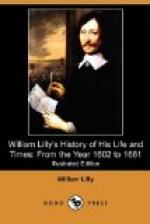You cannot imagine how much the routing of this drunken parson pleased Mr. Pennington, who paid all charges munificently and thankfully.
But now follows the last and greatest kindness I ever did him. Notwithstanding the committee for sequestrations in Cumberland were his very good friends, yet the sub-sequestrators, of their own heads, and without order, and by strength of arms, secured his irons, his wood, and so much of his personal estate as was valued at seven thousand pounds. Now had I complaint upon complaint: would I suffer my old friend to be thus abused? it was in my power to free him from these villains.
I hereupon advised what was best to do, and was counselled to get Mr. Speaker Lenthall’s letter to the sub-sequestrators, and command them to be obedient to the committee of the county.
Whereupon, I framed a letter myself, unto the sub-sequestrators directed, and with it, myself and Mr. Laurence Maydwell (whom yourself well knew) went to Mr. Speaker, unto whom we sufficiently related the stubbornness of the officers of Cumberland; their disobedience to the committee; and then shewed him the letter, which when he had read over, he most courteously signed, adding withal, that if they proceeded further in sequestring Mr. Pennington, he would command a Serjeant at Arms to bring them up to answer their contempts: I immediately posted that letter to my friend, which when the absurd fellows received, they delivered him possession of his goods again; and, for my pains, when he came to London, gave me one hundred pounds; he died in 1652, of a violent fever. I did carefully, in 1642 and 1643, take notice of every grand action which happened betwixt King and Parliament, and did first then incline to believe, that as all sublunary affairs did depend upon superior causes, so there was a possibility of discovering them by the configurations of the superior bodies; in which way making some essays in those two years, I found encouragement to proceed further, which I did; I perused the writings of the ancients, but therein they were silent, or gave no satisfaction; at last, I framed unto myself that method, which then and since I follow, which, I hope, in time may be more perfected by a more penetrating person than myself.
In 1643, I became familiarly known to Sir Bulstrode Whitlocke, a member of the House of Commons; he being sick, his urine was brought unto me by Mrs. Lisle,[11] wife to John Lisle, afterwards one of the keepers of the Great Seal; having set my figure, I returned answer, the sick for that time would recover, but by means of a surfeit would dangerously relapse within one month; which he did, by eating of trouts at Mr. Sand’s house, near Leatherhead in Surrey. Then I went daily to visit him, Dr. Prideau despairing of his life; but I said there was no danger thereof, and that he would be sufficiently well in five or six weeks; and so he was.




